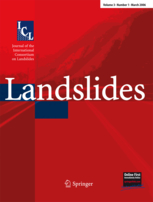Main Information
LCI: PHL2009221500
At 05:53 (UTC+08) on 20 September 2018, the extremely rapid Naga landslide devastated several villages of Naga City, Cebu Island, causing 134 casualties. The landslide destroyed 57 houses and led to the evacuation of 8252 people. Parts of the landslide dammed the nearby Pandan River, which was immediately excavated to prevent flooding of the city center downstream. Landslide deposits covered an area of about 9.46 × 105 m2 with a maximum runout distance of 1.34 km, emplaced on built-up, industrial, and agricultural areas. The estimated total volume is at 27 million m3. The landslide slipped through a bedded limestone sequence of the Plio-Pleistocene Carcar Formation. A series of tension cracks at the source area were observed three (3) weeks before main failure, which probably indicated progressive deformation prior to failure. The event started as a translational slide which transformed in part to small grain flows and avalanches. Deposits exhibit a very irregular topography comprised of intact megablocks and smaller chaotic fragmented blocks that are spread across gently sloping terrain. The slope failure was possibly triggered by human activities that created steep slopes at the downslope portion of the failed mass.
Location
City / District: Naga
Province: Cebu
Country: Philippines
Latitude: 10:12:30.58 N
Longitude: 123:45:32,57 E
Reporter
Reporter 1: John Romel Flora
Reporter 2: Sandra Catane
Landslide Type
Material: Rock
Movement: Complex
Velocity (mm/sec): Very Rapid (5×10¹ - 5×10³)
Depth (m): Deep-Moderate (20 - 50)
Slope (degree): Extremely steep (50 or more)
Volume (m³): Very Large (10⁷-10⁸)
Date of Occurence
Date of Occurence: 09/20/2018
Other Information
Land use (Source Area): Farming, Human settlement, Industrial use, Road
Land use (Run-out/deposition area): Farming, Urban area, Industrial use, Road, River
Other Activity: Active in the past
Triggering Factor: Human activity
Death(s) & Missing: 134
Houses and other structural damage: 57







